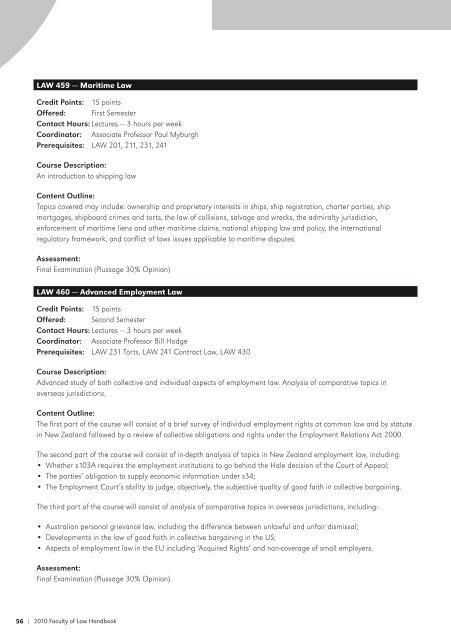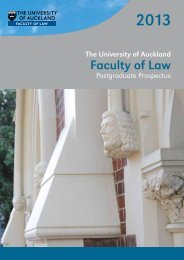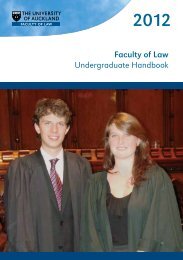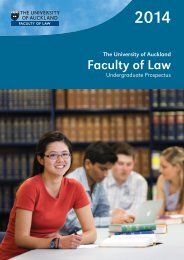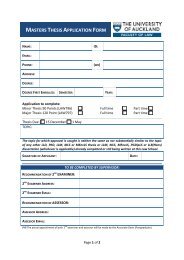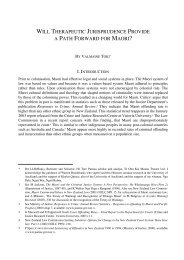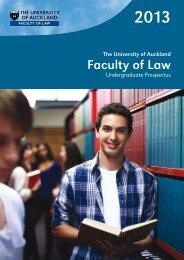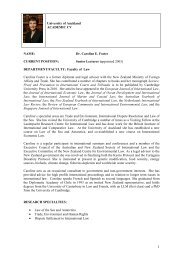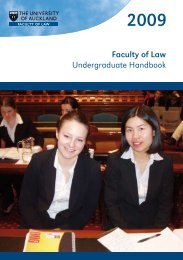Faculty of Law Undergraduate Handbook - Faculty of Law - The ...
Faculty of Law Undergraduate Handbook - Faculty of Law - The ...
Faculty of Law Undergraduate Handbook - Faculty of Law - The ...
- No tags were found...
You also want an ePaper? Increase the reach of your titles
YUMPU automatically turns print PDFs into web optimized ePapers that Google loves.
LAW 459 — Maritime <strong>Law</strong>Credit Points: 15 pointsOffered: First SemesterContact Hours: Lectures — 3 hours per weekCoordinator: Associate Pr<strong>of</strong>essor Paul MyburghPrerequisites: LAW 201, 211, 231, 241Course Description:An introduction to shipping lawContent Outline:Topics covered may include: ownership and proprietary interests in ships, ship registration, charter parties, shipmortgages, shipboard crimes and torts, the law <strong>of</strong> collisions, salvage and wrecks, the admiralty jurisdiction,enforcement <strong>of</strong> maritime liens and other maritime claims, national shipping law and policy, the internationalregulatory framework, and conflict <strong>of</strong> laws issues applicable to maritime disputes.Assessment:Final Examination (Plussage 30% Opinion)LAW 460 — Advanced Employment <strong>Law</strong>Credit Points: 15 pointsOffered: Second SemesterContact Hours: Lectures — 3 hours per weekCoordinator: Associate Pr<strong>of</strong>essor Bill HodgePrerequisites: LAW 231 Torts, LAW 241 Contract <strong>Law</strong>, LAW 430Course Description:Advanced study <strong>of</strong> both collective and individual aspects <strong>of</strong> employment law. Analysis <strong>of</strong> comparative topics inoverseas jurisdictions.Content Outline:<strong>The</strong> first part <strong>of</strong> the course will consist <strong>of</strong> a brief survey <strong>of</strong> individual employment rights at common law and by statutein New Zealand followed by a review <strong>of</strong> collective obligations and rights under the Employment Relations Act 2000.<strong>The</strong> second part <strong>of</strong> the course will consist <strong>of</strong> in-depth analysis <strong>of</strong> topics in New Zealand employment law, including:• Whether s103A requires the employment institutions to go behind the Hale decision <strong>of</strong> the Court <strong>of</strong> Appeal;• <strong>The</strong> parties’ obligation to supply economic information under s34;• <strong>The</strong> Employment Court’s ability to judge, objectively, the subjective quality <strong>of</strong> good faith in collective bargaining.<strong>The</strong> third part <strong>of</strong> the course will consist <strong>of</strong> analysis <strong>of</strong> comparative topics in overseas jurisdictions, including:• Australian personal grievance law, including the difference between unlawful and unfair dismissal;• Developments in the law <strong>of</strong> good faith in collective bargaining in the US;• Aspects <strong>of</strong> employment law in the EU including ‘Acquired Rights’ and non-coverage <strong>of</strong> small employers.Assessment:Final Examination (Plussage 30% Opinion)56 | 2010 <strong>Faculty</strong> <strong>of</strong> <strong>Law</strong> <strong>Handbook</strong>


